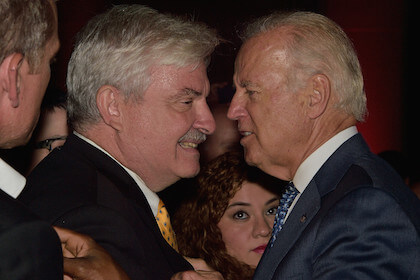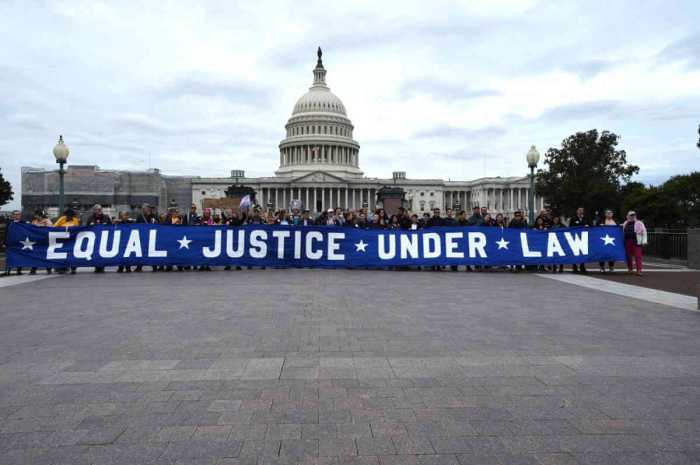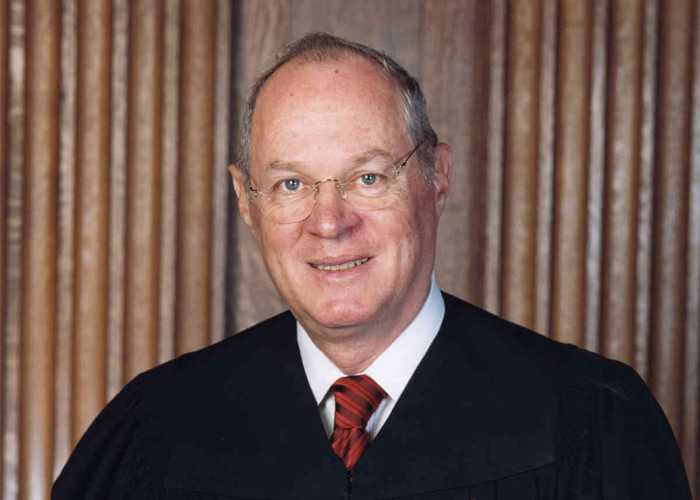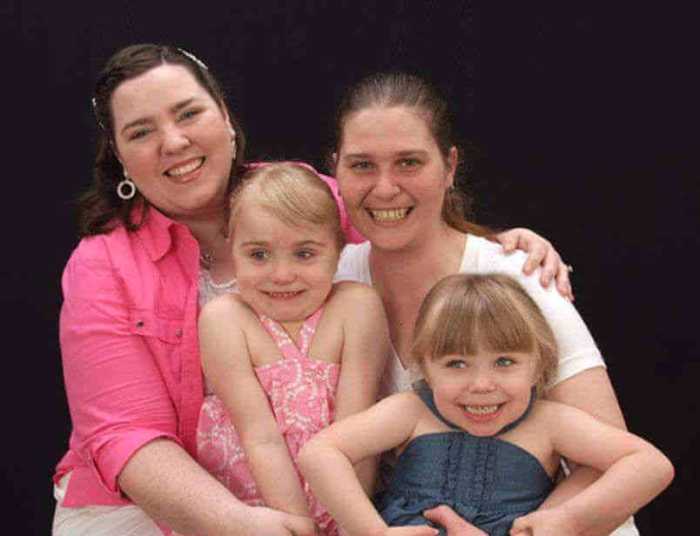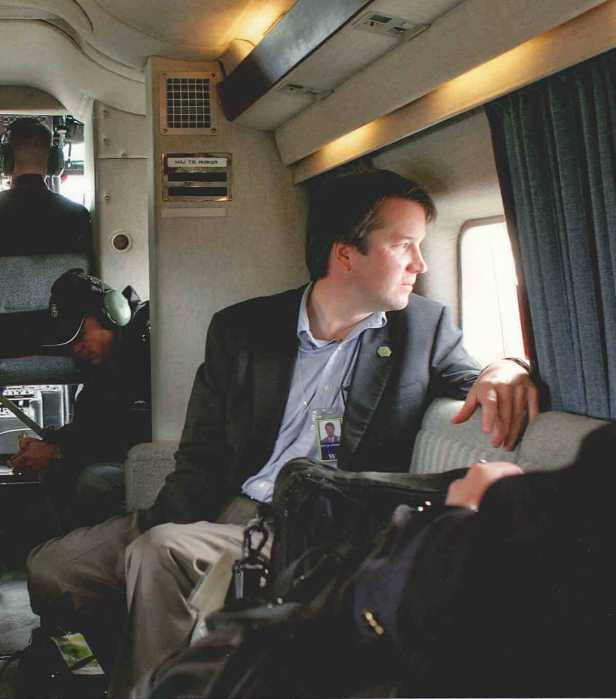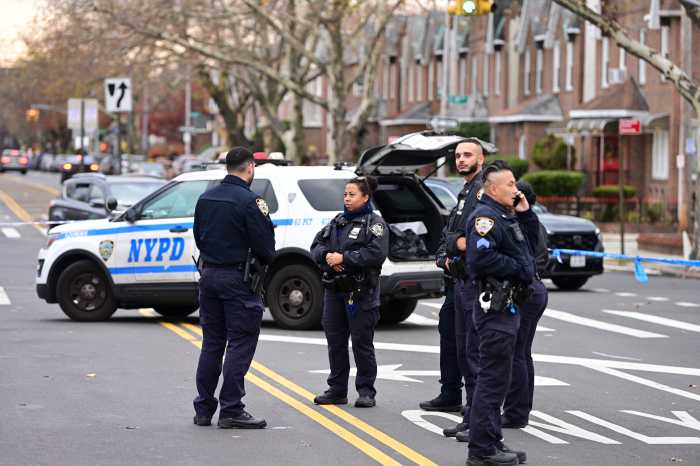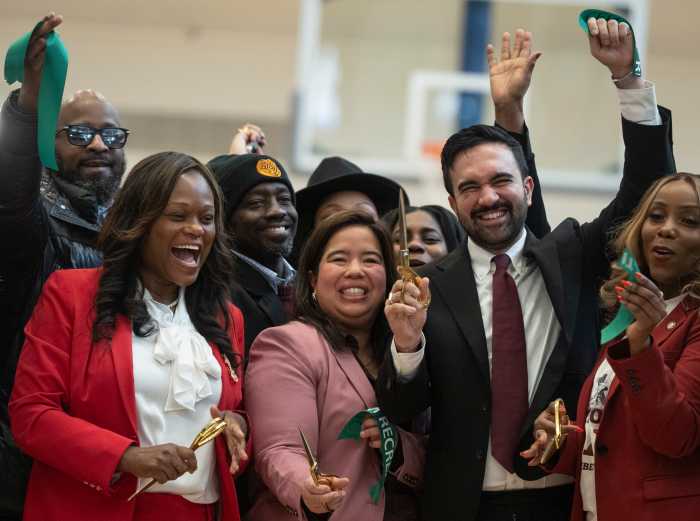Vice President Joe Biden at the Freedom to Marry celebration on July 9. | DONNA ACETO
The US Supreme Court’s decision opening marriage to same-sex couples in all 50 states has mostly been celebrated two-by-two as long-denied rights were granted in clerks’ offices across the South and Midwest.
But the campaign of Freedom to Marry, which worked to coordinate grassroots, political, and legal efforts on the issue for the last 12 years, was celebrated by more than a thousand activists at Cipriani on Wall Street on July 9, which is the anniversary, the group’s president Evan Wolfson told the crowd, of the day in 1868 when the 14th Amendment was adopted — the equal protection amendment that Justice Anthony Kennedy used to declare laws banning same-sex marriage unconstitutional.
Wolfson kicked off the evening by introducing his old boss, Vice President Joe Biden, 72, who gave a moving speech tracing his own history with gay and other civil rights issues, but mostly gave credit to those assembled for achieving a decision that he said will rank right up there with Brown v. Board of Education, the 1954 ruling declaring “separate but equal” schools for African Americans unconstitutional.
Vice President Joe Biden joins his former intern Evan Wolfson as movement gathers in celebration
“It’s wonderful to be in a place that’s going out of business,” Biden said.
He spoke of how when he was a 17-year-old kid, he and his Irish Catholic father saw two men kissing each other good-bye in public.
“I turned and looked at my dad, and I’ll never forget what he said. ‘Joey, they love each other, it’s simple,’” Biden recalled. (This reporter got an opportunity to tell the vice president afterwards that I had a similar experience with my father before I came out.)
Freedom to Marry's founder and executive director Evan Wolfson. | DONNA ACETO
The point Biden drove home in his remarks is that those who worked on the issue all these years deserve the credit, not him ––though video was shown of him coming out for same-sex marriage in May 2012 on “Meet the Press,” widely credited with getting President Barack Obama to do the same a couple of days later in the midst of his re-election campaign. That one-two punch advanced the issue mightily –– and energized the Obama-Biden base.
“But I know it hasn’t been simple for a lot of you,” Biden said, “especially those of you who are older. It took personal courage — physical courage.”
Biden talked about taking on Robert Bork in the Senate Judiciary Committee because that Supreme Court nominee of Ronald Reagan’s did not believe people had any rights that weren’t explicitly stated in the Constitution. Bork was not confirmed and Reagan instead nominated a conservative jurist named Anthony Kennedy, who went on to write all four of the landmark pro-gay decisions for the court: the Romer decision striking down an anti-gay Colorado voter initiative in 1996, the 2003 Lawrence sodomy opinion, the Windsor ruling in 2013 that eliminated the most significant portion of the Defense of Marriage Act, and last month’s Obergefell decision.
Biden urged the assembled to take on the next LGBT rights fight –– federal anti-discrimination legislation.
“I am confident when we take the case to the American people, we will win,” he said. “The next door will be a hell of a lot easier to open.”
Later in the evening, Wolfson, wearing a lei symbolic of his role in winning the first same-sex marriage case (later overturned when the state's voters gave the legislature the authority to do so) as co-counsel with Dan Foley in Hawaii in 1996, said that “no one person, no one organization, no one state, no one case, no one method” brought us to this day. “It took a whole movement to bring us to this victory.”
To illustrate the point, he asked people to raise their hands if they had done one from a list of things ––from knocking on doors to working in a group to donating to one or more of the battles. By the time he was done most every hand had gone up.
Tim Sweeney , who helped “cook up” the idea for Freedom to Marry 15 years ago, with Patricia Evert, a Democratic activist and donor and New York City AIDS Memorial board member, and Ross Levi, who was executive director of the Empire State Pride Agenda when the marriage equality law was passed here in 2011. | DONNA ACETO
Wolfson especially thanked all the legal groups –– the American Civil Liberties Union, the Boston-based Gay & Lesbian Advocates & Defenders (GLAD), Lambda Legal, and the San Francisco-based National Center for Lesbian Rights. He singled out for particular mention the “25 years of leadership” on the issue from GLAD’s Mary Bonauto, who argued the case before the high court. And he thanked all the big funders, especially Tim Sweeney of the Haas, Jr. Fund and later the Gill Foundation who “cooked up” the idea for the coordinated campaign with him 15 years ago.
Many, many veterans of this fight were on hand.
Tony Sullivan, an Australian native, legally married American Richard Adams in Boulder, Colorado in 1975, only to have an immigration official write to them that they would not recognize the marriage of “two faggots,” forcing them to leave the US and hide when they returned. He said of decision morning, “I chose to spend the day alone and with Richard. All I could say is that we never expected to see it happen so soon.” Adams, 65, died in 2012. They are the subject of the PBS documentary “Limited Partnership” that can be seen online at video.pbs.org/video/2365484752/.
Cathy Marino-Thomas, a leader of the grassroots Marriage Equality group, said, “I love everybody tonight,” but added that activists like her will be “writing our own book” since many of the accounts out there now make scant mention of volunteer campaigns that kept the issue in the public eye when the big well-funded gay groups were still shying away from it.
Marc Solomon, the campaign director at Freedom to Marry who wrote “Winning Marriage,” said that when the ruling came down on June 26, “I felt so ecstatic that it was like I was floating. I felt like I didn’t have anything to worry about anymore. I also thought about what an amazingly better world we’re creating for younger LGBT people.”
Solomon started working on the issue in 2001 as a volunteer in Massachusetts, then took on the advocacy fulltime in 2004.
Noemi Masliah, a longtime attorney on LGBT immigration issues, said when she heard the decision she felt, “I do. I do. I’m done.”
Andy Humm and the vice president share memories of dads who taught them something about basic human compassion. | DONNA ACETO
Abby Rubenfeld, a Nashville lawyer who once led Lambda Legal and represented the Tennessee plaintiffs in the case that went to the high court, said implementation of the order is going “smoothly” back home. The attitude in some clerks’ offices is “we’re not happy, but it’s the law.”
Veteran activist Joy Tomchin said when she first heard about this issue 30 years ago, she thought it was ridiculous: “Why put money into this?” But she credited Wolfson with seeing it through brilliantly. “We’re so proud of him.” (She did, however, mention being troubled by lesbians using the term “wife” for their spouse.)
Reverend Debra Haffner, president of the Religious Institute, which works on sexual health, education, and justice issues, said, “I can’t tell you how thrilling this is. It will allow me to perform [legal] marriages now for any couple that are in love.” She spoke proudly of her gay son and of having Mary Bonauto come up to her at the party.
Ilene Sameth, a leader in the lesbian and Jewish communities, said, “The fact that this night is happening the same day that South Carolina voted to take down the Confederate flag seems like a perfect confluence.”
E.J. Graff, who wrote the book “What is Marriage For?” in 1999, said, “A lot of us knew it was coming, but only Evan knew it was coming so soon.”
Connie Ress, active with Marriage Equality New York since 1998 and co-founder of Marriage Equality USA with Jesús Lebron and James Loney in 2001, said, “It felt like we all did it. We knew it would happen.”
Broadway producer Ted Snowdon, 69, who just married Duffy Violante, 71, with Wolfson presiding, said many of the people who came to their wedding on June 14 “had never been to a gay wedding –– including some of the gay people… It is rare in our lives to get a chance to see something completed. There was a finality to [the decision]. It only took 19 years [from the Hawaii case in 1996]! And Evan dreamed it up 32 years ago.”
New York Law School professor Arthur Leonard, who has tracked every step of the legal process that led to the victory for Gay City News, admitted to some sense of “deflation” in the wake of the decision. “I’m decompressing,” he said, noting there will now be fewer big LGBT decisions to write about in the short run.
Michael Adams, executive director of SAGE, Services and Advocacy for GLBT Elders, said his group has a program called “Talk Before You Walk,” guiding older LGBT people through the implications of marrying later in life for the benefits that they receive. Edie Windsor, who won gay married couples federal rights at the high court in 2013, has an article about that at goo.gl/SUhUyH.
Wolfson said the second call he got the morning of the decision, after congratulations from Biden, was from Bernie Cohen, the lawyer who argued Loving v. Virginia in 1967 that overturned laws against interracial marriage.
“He told me that was the high point of his life, but he was so glad that it didn’t stop there,” said Wolfson, who added, “We must all commit that it won’t stop here. We must continue to work for a more perfect union for everyone.”

